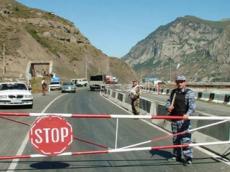|
|
TODAY.AZ / Analytics
Armenia, Russia trade relations in steady decline
11 June 2014 [12:40] - TODAY.AZ
 By AzerNews
By AzerNewsTrade relations between Armenia and Russia is in a steady decline since the end of May, 2014.
The Russian market is one of the main export market for Armenia, and Russia is the leading exporter to Armenia.
The only road, which links Armenia to Russia is still closed after a mudslide on the Russian-Georgian border on May 17. The reopening of the road is expected at the end of June.
Now Armenia's poor economy faces new challenges in export of its products to Russia.
Several Armenian export companies have suspended their activities, as the Upper Lars customs point is closed and they cannot export their products to Russia.
Local economists predict serious consequences for the Armenian economy, as the agricultural season has started. They said almost half of the Armenian population, who lives in the villages will lose their incomes.
However, the summer harvest season was unpleasant for Armenia, as nature was ruthless towards the country. At the end of March, abnormal cold weather has demolished almost 90 percent of the apricot harvest which Armenia is so proud of.
Apricot is one of the main fruits in Armenia's exports. Armenia expected 55,000 tons of apricot harvest, but the country has already lost 50,000 tons. Armenia will not export apricot this year, as it lacks of apricot harvest.
The mudslide on the Russian-Georgian border also reduced significantly the number of various products in the Armenian markets. Local markets face deficit in tomato paste, as the Armenian producers lack of glass packages, which they import from Russia. The trucks loaded with glass packages wait for the opening of the Upper Lars customs point.
The closed road to Russia is the next serious blow to the Armenian economy, which is still unable to achieve any progress. Armenia hastens Georgia, and even offered assistance to complete the restoration works on the road. This road plays an important role in Armenia's economic relations with the external world, as the country is under blockade in the South Caucasus region due to its aggressive policies towards neighboring Azerbaijan and Turkey.
URL: http://www.today.az/news/analytics/134383.html
 Print version
Print version
Views: 3337
Connect with us. Get latest news and updates.
See Also
- 16 January 2026 [08:30]
Middle Corridor shows why process matters more than maps - 15 January 2026 [13:58]
Unrest in Iran sparks international warnings and diplomatic moves - 15 January 2026 [08:30]
How technical framework pushed Zangazur Corridor one step closer - 14 January 2026 [17:49]
Armenia takes control of its borders as old dependencies from Russia unravel [INTERVIEW] - 14 January 2026 [14:00]
Iran’s harsh rhetoric towards US and what it says about regime insecurity - 14 January 2026 [08:30]
How Azerbaijan using post-war rebuilding to reduce oil dependence - 13 January 2026 [13:47]
How Azerbaijan securing water resources in era of global scarcity - 12 January 2026 [19:15]
What January 3 mean for Trump? - Soleimani and Venezuela's Maduro - 12 January 2026 [08:30]
How Middle Corridor transforming geography into economic strategy - 11 January 2026 [18:19]
Nobel Peace Prize debate: Trump, Venezuela, and unfinished conflicts
Most Popular
 Armenia is reforming the army: revanchists are worried
Armenia is reforming the army: revanchists are worried
 Azerbaijan launches desalination of Caspian water - innovations and international experience
Azerbaijan launches desalination of Caspian water - innovations and international experience
 Fuel shortage has hit Yerevan - what prevents it from turning to Azerbaijan?
Fuel shortage has hit Yerevan - what prevents it from turning to Azerbaijan?
 Baku conference to spotlight racism and violence against Sikhs in India
Baku conference to spotlight racism and violence against Sikhs in India
 NATO allies deploy troops to Greenland as Trump’s annexation threats strain alliance
NATO allies deploy troops to Greenland as Trump’s annexation threats strain alliance
 Armenia takes control of its borders as old dependencies from Russia unravel [INTERVIEW]
Armenia takes control of its borders as old dependencies from Russia unravel [INTERVIEW]
 TotalEnergies and Bapco Energies launch BxT Trading joint venture in Bahrain
TotalEnergies and Bapco Energies launch BxT Trading joint venture in Bahrain
